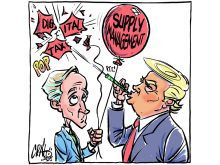When the House of Commons ended debate last week on new wheat board legislation, it left a floor figuratively littered with unanswered questions.
Some were questions that the farmer-elected advisory committee has been trying for months to get the government to answer. (See opposite page.)
Others were more rhetorical, as when Reform MP Jake Hoeppner called for an end to the wheat board monopoly, asking “why not a monopoly on lawyer services or teachers?”
It’s a pity someone didn’t answer and turn Hoeppner’s example back on him.
Read Also

Agriculture needs to prepare for government spending cuts
As government makes necessary cuts to spending, what can be reduced or restructured in the budgets for agriculture?
The reason there’s no “Canadian Lawyer Board” is that society doesn’t believe lawyers should have such an advantage in marketing their services. Some would say they already have excessive power through their professional associations that review legal training and fee schedules.
Similarly, teachers are trying through unions to get some of the economic benefits farmers enjoy through the wheat board. Teachers and lawyers know what they can collectively lose if they’re free to undercut each other in selling their services.
Some of the unanswered questions, however, were directed at the Reform members.
Liberal MP Gerry Byrne received no direct answer when he asked whether it would be fair for the board to benefit from government guarantees and low interest rates if it were competing with private companies to buy and sell farmers’ grain.
Perhaps the Reform MPs didn’t want to admit the obvious – such a situation would not only be unfair to the private companies, it might well be illegal under coming investment treaties. That’s one reason why the so-called “dual market” can’t work.
If ADM had the right to buy wheat direct from farmers in Canada and export it, in competition with the board and other grain companies, its famed lobbyists and directors (who include former prime minister Brian Mulroney) would quickly get to work to eliminate any preferential government treatment of the competition.
Indeed, if they did not do so they could be accused of not looking after the interests of their shareholders.
Farmers would thus lose not only the advantage of single-desk selling, but also the benefits of government guarantees and low interest rates. That’s an expensive price to pay to conform to purist open-market ideology.
Flaws in Reform reasoning, however, don’t excuse wheat board minister Ralph Goodale from refusing to respond to the advisory committee’s questions. Farmers deserve answers.
















